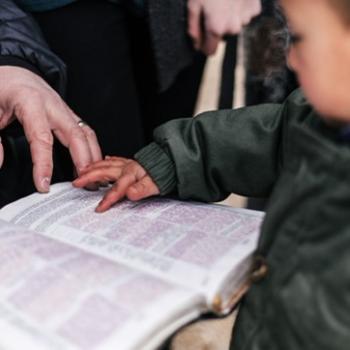Like it or not, God’s will for your life is that you would suffer.
In various capacities, one may sense relief, anger, frustration, concern, and a host of other emotions that one ought to wrestle with as they come to grips with the reality of death, sickness, pain, trials, and the onslaught of unjust actions in humanity. It is right and proper for Christians and non-Christians alike to deliberate over and develop convictions on these things. However, far too often there is a complete disregard to suffering well. If suffering is simply random, chaotic experiences that one may or may not face in this life, then suffering is simply something worthy of escaping.
Yet if suffering is something appointed for a purpose, I sense most in this world have no intentions of seeing that purpose realized in their own life. Nobody likes to suffer in the midst of their trial, but suffer we must. What I am speaking to here is something intrinsic to Calvinistic theology: God is utterly sovereign in all things. More clearly, I am speaking with direct inference toward all things falling under His jurisdiction and that not one single thing in history has escaped His sovereign decree, including suffering. Boiled down to the simplest explanation: indeed, God is in complete control and has, in fact, ordained all things.
Naturally, I believe God has not only superintended all things within His divine decree, but that man’s role in playing out this divine drama is still subject to judgment. What I mean by this, very simply, is that though God has orchestrated all things that have been, are now happening, and will ever be – man is held responsible for acting in a manner that is contrary to His revealed will.
How is this reconciled through the Calvinistic worldview?
Quite simply, we find three main expressions of the will of God in the scriptures:
God’s Decretive Will
The Decretive Will of the Lord is also often called “God’s sovereign will” and speaks directly to that which God will bring to pass whatever He has decreed from before the foundations of the earth were laid. This is the “secret” will of the Lord, that which is expressly forbidden knowledge – as it belongs to the Lord and the Lord alone. It is not revealed to mankind outside of instances in scripture that give general indication of what shall come to be – but not how. It is presumptuous sin for man to seek out this knowledge, it is designated by the Lord and as such, it shall surely come to pass.
No man has any ability to thwart God’s Decretive Will. Interestingly, there are accounts within scripture where man is held responsible for acting out God’s Decretive will even though they are in violation of God’s preceptive will – and scripture has no issues assigning the catalyst, or cause of this, to God, without insinuation of Him being evil in any respect. Rather, it is man, who contrary to scripture, assigns this charge.
Examples: Job 23:13; Isaiah 14:24, 46:10-11; 1 Thess. 5:23-24
God’s Preceptive Will
The Preceptive Will of the Lord is that which is revealed within the scriptures through the Law, direct commandments of God, and through prophetic utterance in the account of the prophets recorded in scripture. Man has the ability to disobey this aspect of the will of God, but it is not intrinsic to man’s right to do so. More clearly, while man can disobey God’s revealed, or preceptive will, he will surely be judged for it.
Another aspect of this falls within the nature of debate over the will of man, for obvious reasons. The proper understanding of man falls within an understanding of their natural disposition toward disobedience. This does not entail that every man is acting in the worst conceivable way at every moment of their existence. It simply teaches that man’s disposition, or will, is at odds with God due to the fall of mankind, and he operates in this disposition de facto.
Examples: 1 Thess. 4:3-6; Rom. 1:21-23; Eph. 5:17-20
God’s Will of Permission
God’s will of permission then is the final categorical aspect of the will of God and it is used to describe that which is allowed by the Lord even though it brings Him no good pleasure. There is some semantic overlap in this category and the former (preceptive will) – but they are not one in the same. God is not pleased to send any to Hell on the basis of unbelief, yet He has revealed that His standard of judgment upon the unbeliever will be condemnation in Hell. Does this reveal some contradiction within the biblical corpus or depict a manic god who says, “If only so and so would have believed?!”
No. It simply reveals facets of the will of God and demonstrates that indeed, He is slow to punish the wicked, longsuffering in extending them every opportunity to repentance, and kind in His grace with which He extends to those in Christ, all the while demonstrating genuine sadness over the lost who will be forever alienated and estranged. Does this indicate man has some power over God? No. It simply reveals that God has actively allowed them to act in a manner that betrays his preceptive will.
Examples: Romans 1:24-32; Acts 7:42; Eph. 2:1-3; Is. 44:18; Psalm 81:11-12
What then, is the Purpose of Calamity and Suffering?
Quite simply, calamity is designed to be a banner. Calamity is a call to repentance. As the tower of Siloam demonstrated, suffering a tragic fate is not indicative of a particular individual’s sin – as tragedy befalls all men (Luke 13:1-5). Rather, it is a catalyst to remind mankind of their frailty and the impending doom of the judgment of God if they are not reconciled to Him. In other words, tragedy is designed with the purpose of bringing mankind to repentance – for all will likewise perish.
Calamity may indeed be the result of individual sin, yet it is not proper for any man to indict another of such a thing as this falls under the Decretive, or secret will of the Lord. It is inaccessible knowledge for one to know for certain if an outcome is a direct result of a particular sin, though in some cases we can make an educated guess. For example, if I get shot in the face because I try to rob a liquor store, you can summarily deduce that I suffered immediate judgment due to personal sin. In the case of natural disaster or casualties of war, it would be improper to make such a judgment.
In the case of war, famine, persecution, and any means of suffering – it stands not only as a banner urging those who experience it to repentance and faith in Christ, but every single person upon the earth. Man is not guaranteed any next day – and the urgency shown in the scriptures toward a call to repentance is immediate. All men shall meet the great equalizer, death, and be subject to immediate judgment. There are no second chances; there is no escape from this reality, save through the gospel of Jesus Christ.
And yet belief in the gospel of Christ does not mean, as some have put it, your best life happens now. Many retain belief in Christ and are called to a life of abject poverty, suffering, and death at the hands of persecutors, yet exemplify a living hope that even angels long to look (1 Peter 1:3-12). Are such things outside of the control of God? By no means – Christ is utterly supreme (Col. 1:15-20). Some may suffer as a result of their own actions – yet this post is namely concerned with those who suffer having done nothing wrong (1 Peter 3:14-22). In all of these cases we find the sovereign Lord who has, in His decretive will, called some to suffer (1 Peter 2:19-24).
There is a general suffering that all men face as a consequence of living in a broken and fallen world and then a particular suffering that is appointed. Think of Job, Joseph, Paul, Peter, and Christ Himself. The concern of the scriptures is not that suffering takes place; indeed, all who desire godliness must suffer! Suffering, though seen by this world as something to escape, is called a blessing – one which endows the recipient to receive a divine reward upon suffering well (Matt 5:3-12). Without hesitation, scripture is replete with examples where the authors attribute the cause of one’s suffering to the Lord – yet notice what they never do; they never once assign wickedness to the Lord (Gen. 50:15-21; Lev. 26:14-46; Josh. 23:15; Jer. 35:17; Is. 10:1-19; Habakkuk; Col. 1:24-29; 2 Cor. 11:16-12:10).
Final Thoughts
The tendency toward vitriol that others who disagree with these sentiments is rather alarming in more than one way. First and foremost, if this does accurately reflect the scripture’s teaching on the matter – the charge that the Calvinistic conception of God is wicked, evil, and unduly cruel, is supreme blasphemy. On the basis that you might be wrong and the Calvinistic understanding might be correct, I would urge you to severe caution in using such language, as you may indeed find yourself decrying the Almighty. Such a thought should terrify anyone who truly fears God.
Secondly, a god who lacks control in any sense, is not philosophically speaking, God. In one sense some will argue for an all-powerful being able to speak things into existence – yet it is too far a cry to suggest that this same being is in complete control of all that He has spoken into existence and can actively guide that creation in His purposes. In reality, I sense there is a greater issue with the concept of God being God than the violation of the will, as the question generally boils down to this: what right has God to violate my will? Man has free will, yet he is in predisposition to act according to his nature, which is in opposition to God, thus, he freely acts against his Maker.
There are, of course, a host of issues tied to this: salvation, damnation, human responsibility, etc. This post simply cannot cover all of these topics in the scope needed without boring most to tears. There are other, far more exhaustive resources on this topic dealing with objections that naturally arise out of such a theological treatment. This post is not indicative of a full treatment and cannot possibly do anything other than give a cursory treatment of the issues. If you would like a fuller treatment on a particular issue, feel free to drop a comment below and we may be able to write another post in response, or point you to available resources.













